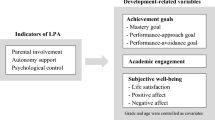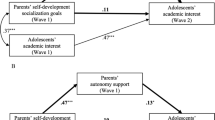Abstract
Although parents are increasingly involved in their college students’ academic lives, scholars have yet to investigate parents’ role in their college students’ school engagement. We hypothesized that college students’ self-regulation would mediate the relation between parent–child relationship quality and school engagement. For the 790 undergraduates who completed questionnaires online, self-regulation mediated the relation between mother–child relationship quality and school engagement for men, and an indirect effect was found for the relation between father–child relationship quality and school engagement by way of self-regulation. Therefore, parents continue to matter in promoting their college students’ academic success.

Similar content being viewed by others
References
Aquilino, W. (1997). From adolescent to young adult: A prospective study of parent-child relations during the transition to adulthood. Journal of Marriage and Family, 59, 670–686. Retrieved from http://search.proquest.com/docview/219749043?accountid=12164.
Aquilino, W. (2006). Family relationships and support systems in emerging adulthood. In J. J. Arnett & J. L. Tanner (Eds.), Emerging adults in America: Coming of age in the 21st century (pp. 193–217). Washington, DC: American Psychological Association.
Arnett, J. J. (2004). Emerging adulthood: The winding road from late teens through the twenties. New York, NY: Oxford University Press.
Arnett, J. J. (2006). The psychology of emerging adulthood: What is known, and what remains to be known. In J. J. Arnett & J. L. Tanner (Eds.), Emerging adults in America: Coming of age in the 21st century (pp. 303–330). Washington, DC: American Psychological Association. Retrieved from http://www.jeffreyarnett.com/articles/Arnett_2006_The_Psychology_of_Emerging_Adulthood.pdf.
Arnett, J. J. (2011). Emerging adulthood: The cultural psychology of a new life stage. In L. A. Jensen (Ed.) Bridging cultural and developmental approaches to psychology: New syntheses in theory, research, and policy (pp. 255–275). New York, NY: Oxford University Press. Retrieved from http://www.jeffreyarnett.com/ArnettEmergingAdulthood2011.pdf.
Astin, A. W. (1993). What matters in college? Four critical years revisited. San Francisco, CA: Jossey-Bass.
Baker, C. N., & Hoerger, M. (2012). Parental child-rearing strategies influence self-regulation, socio-emotional adjustment, and psychopathology in early adulthood: Evidence from a retrospective cohort study. Personality and Individual Differences, 52, 800–805. doi:10.1016/j.paid.2011.12.034.
Barry, C. M., Padilla-Walker, L. M., Madsen, S. D., & Nelson, L. J. (2008). Impact of maternal relationship quality on emerging adults’ prosocial tendencies: Indirect effects via regulation of prosocial values. Journal of Youth and Adolescence, 37, 581–591. doi:10.1007/s10964-007-9238-7.
Baumrind, D. (1971). Current patterns of parental authority. Developmental Psychology, 4(1, Pt. 2), 1–103. doi:10.1037/h0030372.
Bowlby, J. (1985). Attachment and loss: Attachment (Vol. 1). New York, NY: Basic Books. rev. ed..
Carbery, J., & Buhrmester, D. (1998). Friendship and need fulfillment during three phases of young adulthood. Journal of Social and Personal Relationships, 15, 393–409. doi:10.1177/0265407598153005.
Carver, C. S., & Scheier, M. F. (1981). Attention and self-regulation: A control-theory approach to human behavior. New York, NY: Springer.
Chickering, A. W. (1969). Education and identity. San Francisco, CA: Jossey-Bass.
Chickering, A. W., & Reisser, L. (1993). Education and identity (2nd ed.). San Francisco, CA: Jossey-Bass.
Cutrona, C. E., Cole, V., Colangelo, N., Assouline, S. G., & Russell, D. W. (1994). Perceived parental social support and academic achievement: An attachment theory perspective. Journal of Personality and Social Psychology, 66, 369–378. doi:10.1037/0022-3514.66.2.369.
Day, R. D., & Padilla-Walker, L. M. (2009). Mother and father connectedness and involvement during early adolescence. Journal of Family Psychology, 23, 900–904. doi:10.1037/a0016438.
Donnelly, R., Renk, K., & McKinney, C. (2013). Emerging adults’ stress and health: The role of parent behaviors and cognitions. Child Psychiatry and Human Development, 44, 19–38. doi:10.1007/s10578-012-0309-y.
Fass, M. E., & Tubman, J. G. (2002). The influence of parental and peer attachment on college students’ academic achievement. Psychology in the Schools, 39, 561–573. doi:10.1002/pits.10050.
Fredricks, J. A., Blumenfeld, P. C., & Paris, A. H. (2004). School engagement: Potential of the concept, state of the evidence. Review of Educational Research, 74, 59–109. Retrieved from http://search.proquest.com/docview/214138084?accountid=12164.
Fredricks, J. A., Blumenfeld, P. C., & Paris, A. H. (2005). School engagement. In K. A. Moore & L. H. Lippman (Eds.), What do children need to flourish? Conceptualizing and measuring indicators of positive development. New York, NY: Springer Science.
Gonzalez-DeHass, A., Willems, P. P., & Holbein, M. F. D. (2005). Examining the relationship between parental involvement and student motivation. Educational Psychology Review, 17, 99–123. doi:10.1007/s10648-005-3949-7.
Halperin, S. (1998). The forgotten half revisited. American youth and young families, 1988–2008. Washington, DC: American Youth Policy Forum.
Harper, C. E., Sax, L. J., & Wolf, D. S. (2012). The role of parents in college students’ sociopolitical awareness, academic, and social development. Journal of Student Affairs Research and Practice, 49, 137–156. doi:10.1515/jsarp-2012-6147.
Hayes, A. F. (2009). Beyond Baron and Kenny: Statistical mediation analysis in the new millennium. Communication Monographs, 76(4), 408–420. doi:10.1080/03637750903310360.
Hoerger, M., Quirk, S. W., & Weed, N. C. (2011). Development and validation of the Delaying Gratification Inventory. Psychological Assessment, 23, 725–738. doi:10.1037/a0023286.
Keup, J. R. (2007). Great expectations and the ultimate reality check: Voices of students during the transition from high school to college. Journal of Student Affairs Research and Practice, 44, 3–31. doi:10.2202/1949-6605.1752.
Kuh, G. D., Cruce, T. M., Shoup, R., Kinzie, J., & Gonyea, R. M. (2008). Unmasking the effects of student engagement on first-year college grades and persistence. The Journal of Higher Education, 79(5), 540–563.
McKinney, C., & Renk, K. (2008). Differential parenting between mothers and fathers: Implications for late adolescents. Journal of Family Issues, 29, 806–827. doi:10.1177/0192513X07311222.
Moilanen, K. L., Shaw, D. S., & Fitzpatrick, A. (2010). Self-regulation in early adolescence: Relations with mother–son relationship quality and maternal regulatory support and antagonism. Journal of Youth and Adolescence, 39, 1357–1367. doi:10.1007/s10964-009-9485-x.
National Center for Education Statistics. (2013). The condition of education, 2013. Washington, DC: United States Department of Education. Retrieved from http://nces.ed.gov/pubsearch/pubsinfo.asp?pubid=2013037.
National Survey of Student Engagement. (2008). Promoting engagement for all students: The imperative to look within. Bloomington, IN: Bloomington Indiana University Center for Postsecondary Research.
Nelson, L. J., Padilla-Walker, L. M., Christensen, K. J., Evans, C. A., & Carroll, J. S. (2011). Parenting in emerging adulthood: An examination of parenting clusters and correlates. Journal of Youth and Adolescence, 40, 730–743. doi:10.1007/s10964-010-9584-8.
Niemiec, C. P., Lynch, M. F., Vansteenkiste, M., Berstein, K., Deci, E. L., & Ryan, R. M. (2006). Erratum to “The antecedents and consequences of autonomous self-regulation for college: A self-determination theory perspective on socialization”. Journal of Adolescence, 29, 761–775. doi:10.1016/j.adolescence.2007.02.002.
Novak, S. P., & Clayton, R. R. (2001). The influence of school environment and self-regulation on transitions between stages of cigarette smoking: A multilevel analysis. Health Psychology, 20, 196–207.
Padilla-Walker, L. M., Nelson, L. J., & Carroll, J. S. (2012). Affording emerging adulthood: Parental financial assistance of their college-aged children. Journal of Adult Development, 19, 50–58. doi:10.1007/s10804-011-9134-y.
Pascarella, E. T. (1985). College environmental influences on learning and cognitive development: A critical review and synthesis. Higher Education: Handbook of Theory and Research, 1, 1–61.
Preacher, K. J., & Hayes, A. F. (2008). Asymptotic and resampling strategies for assessing and comparing indirect effects in multiple mediator models. Behavior Research Methods, 40, 879–891. doi:10.3758/BRM.40.3.879.
Sax, L. J., & Harper, C. E. (2007). Origins of the gender gap: Pre-college and college influences on differences between men and women. Research in Higher Education, 48, 669–694. doi:10.1007/s11162-006-9046-z.
Strange, A., & Brandt, T. S. (1999). Authoritative parenting and college students’ academic adjustment and success. Journal of Educational Psychology, 91, 146–156. doi:10.1037/0022-0663.91.1.146.
Tanner, J. L. (2006). Recentering during emerging adulthood: A critical turning point in life span human development. In J. J. Arnett & J. L. Tanner (Eds.), Emerging adults in America: Coming of age in the 21st century (pp. 303–330). Washington, DC: American Psychological Association.
Tinto, V. (1993). Leaving college: Rethinking the causes and cures of student attrition (2nd ed.). Chicago, IL: University of Chicago Press.
Turner, E. A., Chandler, M., & Heffer, R. W. (2009). The influence of parenting styles, achievement motivation, and self-efficacy on academic performance in college students. Journal of College Student Development, 50, 337–346. doi:10.1353/csd.0.0073.
Videon, T. M. (2005). Parent–child relations and children’s psychological well-being: Do dads matter? Journal of Family Issues, 26, 55–78. doi:10.1177/0192513X04270262.
Wartman, K. L., & Savage, M. (2008). Parental involvement in higher education: Understanding the relationship among students, parents, and the institution. ASHE Higher Education Report, 33(6), 1–125.
Weidman, J. (1989). Undergraduate socialization: A conceptual approach. Higher Education: Handbook of Theory and Research, 5, 289–322.
Wintre, M. G., & Yaffe, M. (2000). First-year students’ adjustment to university life as a function of relationships with parents. Journal of Adolescent Research, 15, 9–37. doi:10.1177/0743558400151002.
Wolf, D. S., Sax, L. J., & Harper, C. E. (2009). Parental engagement and contact in the academic lives of college students. Journal of Student Affairs Research and Practice, 46, 455–488. doi:10.2202/1949-6605.6044.
Acknowledgments
This research was conducted with support from Project READY: Researching Emerging Adults’ Developmental Years collaborators Larry Nelson, Jason Carroll, Brian Willoughby, and Stephanie Madsen and grant support from the Family Studies Center at Brigham Young University.
Author information
Authors and Affiliations
Corresponding author
Rights and permissions
About this article
Cite this article
Shannon, M., Barry, C.M., DeGrace, A. et al. How Parents Still Help Emerging Adults Get Their Homework Done: The Role of Self-Regulation as a Mediator in the Relation Between Parent–Child Relationship Quality and School Engagement. J Adult Dev 23, 36–44 (2016). https://doi.org/10.1007/s10804-015-9219-0
Published:
Issue Date:
DOI: https://doi.org/10.1007/s10804-015-9219-0




